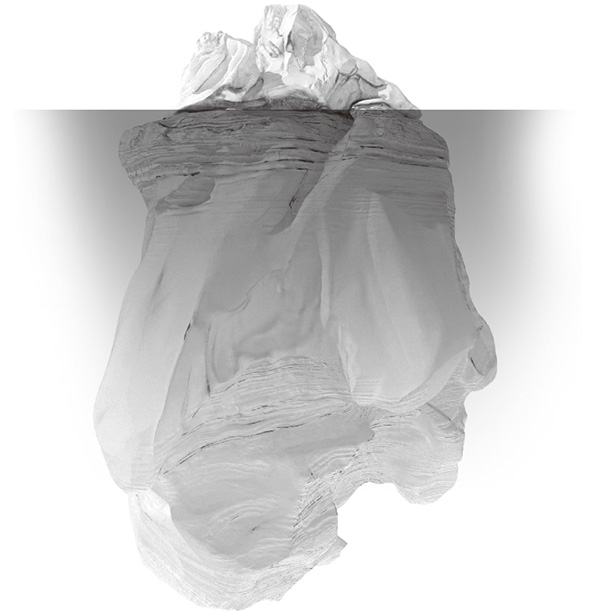
Compass of the Times 239
Compass of the Times 239
Drawing Forth Our Latent Power
Keiko Takahashi
Drawing Forth the Power of the Whole
A month has already passed since the start of the new year, and the outlines of the year are beginning to emerge little by little. The Noto Peninsula earthquake that occurred on New Year’s Day and the plane crash the following day made it clear that the Time of the Unbelievable continues.
We are living in Saha1, a world in which we do not know what will happen next, and anything can happen. Saha is a place where we are forced to endure. None of us who live in this harsh world can avoid encountering trials.
To face the situation of this world, we need to mobilize all the strength we have as human beings.
The power we are usually aware of is only the tip of the iceberg, so to speak, the part above sea level. The real power we hold is the power of the entire iceberg, including the part below sea level. In other words, we must draw forth our latent power—a great power we are not usually aware of or feel.

Intuition and Implicit Knowledge
What is latent power for us? First of all, I would like to consider intuition and implicit knowledge as its clue.
Intuition is the ability to grasp the essence of things directly and instantaneously without using logical reasoning. It is something like the ability of a great shogi player to read a hundred moves ahead in an instant or the ability to immediately draw out necessary information from the sea of memory and make a judgment at a critical moment.
Many people may think that only a limited number of people have this kind of ability. But the reality is that we all possess intuition. “First impression,” which we often say, is the very power of intuition itself. It is also true, however, that we make mistakes in our “first impressions.” Therefore, we need to purify and condition our consciousness so that our intuition is not distorted by the bias of our consciousness. In order to maximize our human potential, it is essential to combine the power of intuition with the power of logic.
The other type of latent power is implicit knowledge, which refers to knowledge based on personal experience and instinct that cannot be easily verbalized.
For example, it is difficult to explain in words how to use chopsticks or how to ride a bicycle. But once we master it, we will never forget it.
The same is true of craftsmanship, creating such things as hardware, building, and food. Craftspeople who have become fully fledged after years of training have accumulated a great deal of experiential knowledge. They may not be able to explain it all in words, but they are able to exercise it.
That is not all. The way we work in various organizations and groups, the many actions we take regarding principles and rules, the know-how of work, and the skills we acquire on the job are all forms of knowledge that have not been verbalized. At the same time, they can be a source of creativity that constantly generates new possibilities.
Much implicit knowledge is also the foundation for decisions and actions related to various crossroads in life.
There are more truths. If we are told that someone close to us who has passed away has become a star, we feel that it is true while looking up at the starry sky. Even if this is not the situation, when we look up at the stars at night, we feel faint nostalgia. These facts show that we know beyond words that the universe itself is our origin. It is none other than the core knowledge of the foundation of our life.
The “Other Self” Is the Key
The first step to unlocking this human potential is to believe that we latently have a power beyond our imagination. I would like you to picture that iceberg in your mind.
The key to drawing it out is the presence of our inner Other Self—the soul that breathes in the depth of our mind. Awakening and calling forth that Other Self harboring unlimited wisdom is the most reliable way to unlock our latent power.
This month, I would like us all to face our latent power.
Editor’s Note
1. Saha (The World of Suffering and Endurance)
Everything rarely goes just as we want. In reality, we are constantly facing ordeals and injustices. I have explained the fact that this world is not paradise by using the Buddhist concept, “this world is Saha.” Saha means a place to endure suffering. Living in Sahapoints to the fact that we must endure distressing situations and accept unbearable things. (Excerpted from p. 35 of The Reason Why You Were Born as You)
Excerpt Translation of G. Monthly Journal February 2024 issue
Preliminary translation by GLA member-volunteers
©GLA 2024 All rights reserved
